Analyzing the Role of Multinationals in Poverty Reduction: A Report
VerifiedAdded on 2022/08/20
|5
|1718
|21
Report
AI Summary
This report explores the significant role of multinational corporations (MNCs) in alleviating poverty within emerging economies. It examines various strategies employed by MNCs, including development aid, loans, and business initiatives, and analyzes their impact on economic growth and social development. The report highlights how MNCs contribute to job creation, infrastructure development, and education, while also acknowledging challenges such as governance limitations and ethical considerations. It provides examples like Nestle, Daimler Chrysler, and others, to illustrate the practical application of poverty reduction models. The report underscores the importance of ethical practices and sustainable approaches for MNCs to effectively contribute to poverty reduction, emphasizing the need for comprehensive strategies that involve system thinking and moral imagination to foster inclusive economic growth. The report also explores the roles of government and the poor as both consumers and producers in poverty alleviation efforts.
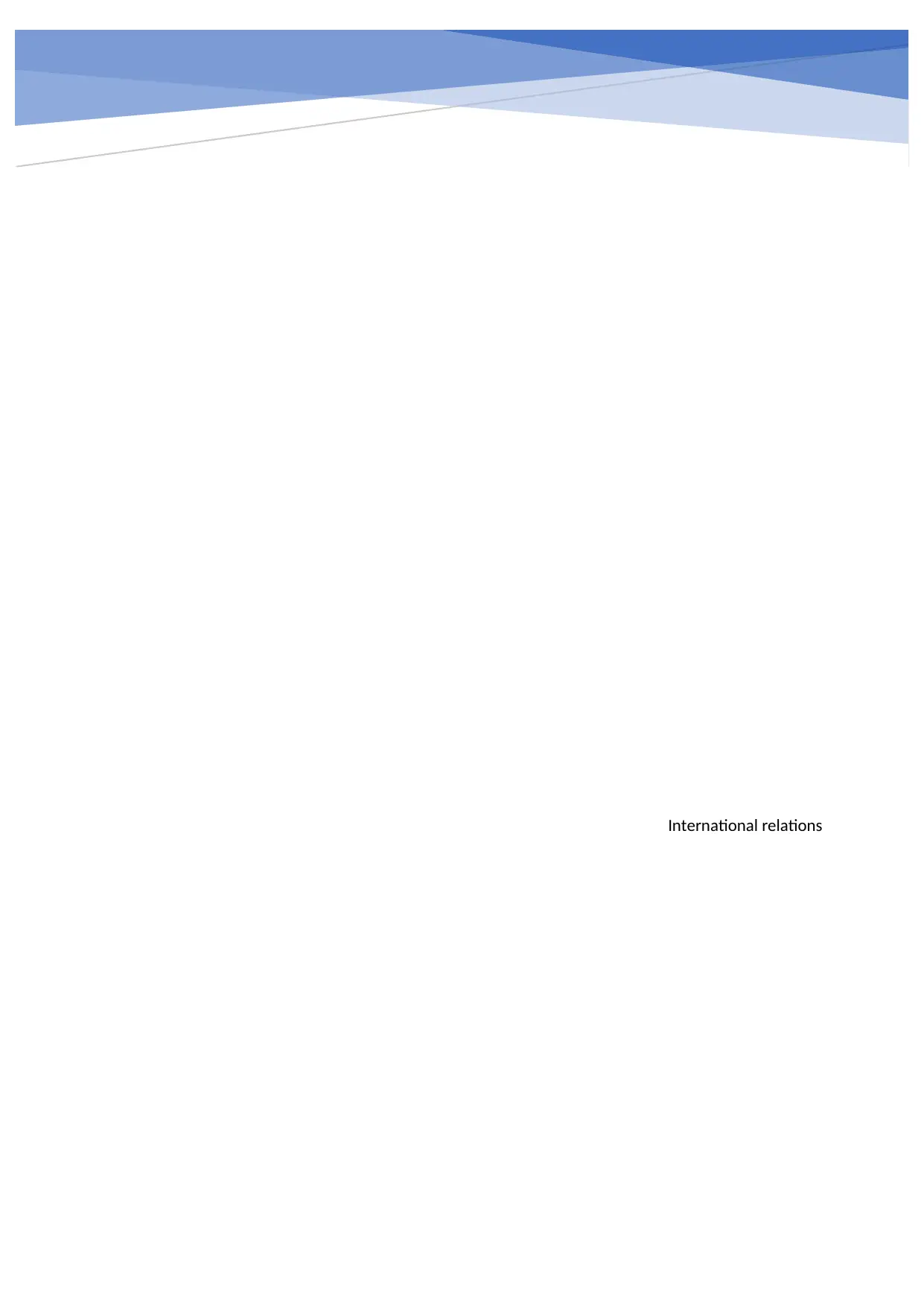
International relations
Paraphrase This Document
Need a fresh take? Get an instant paraphrase of this document with our AI Paraphraser
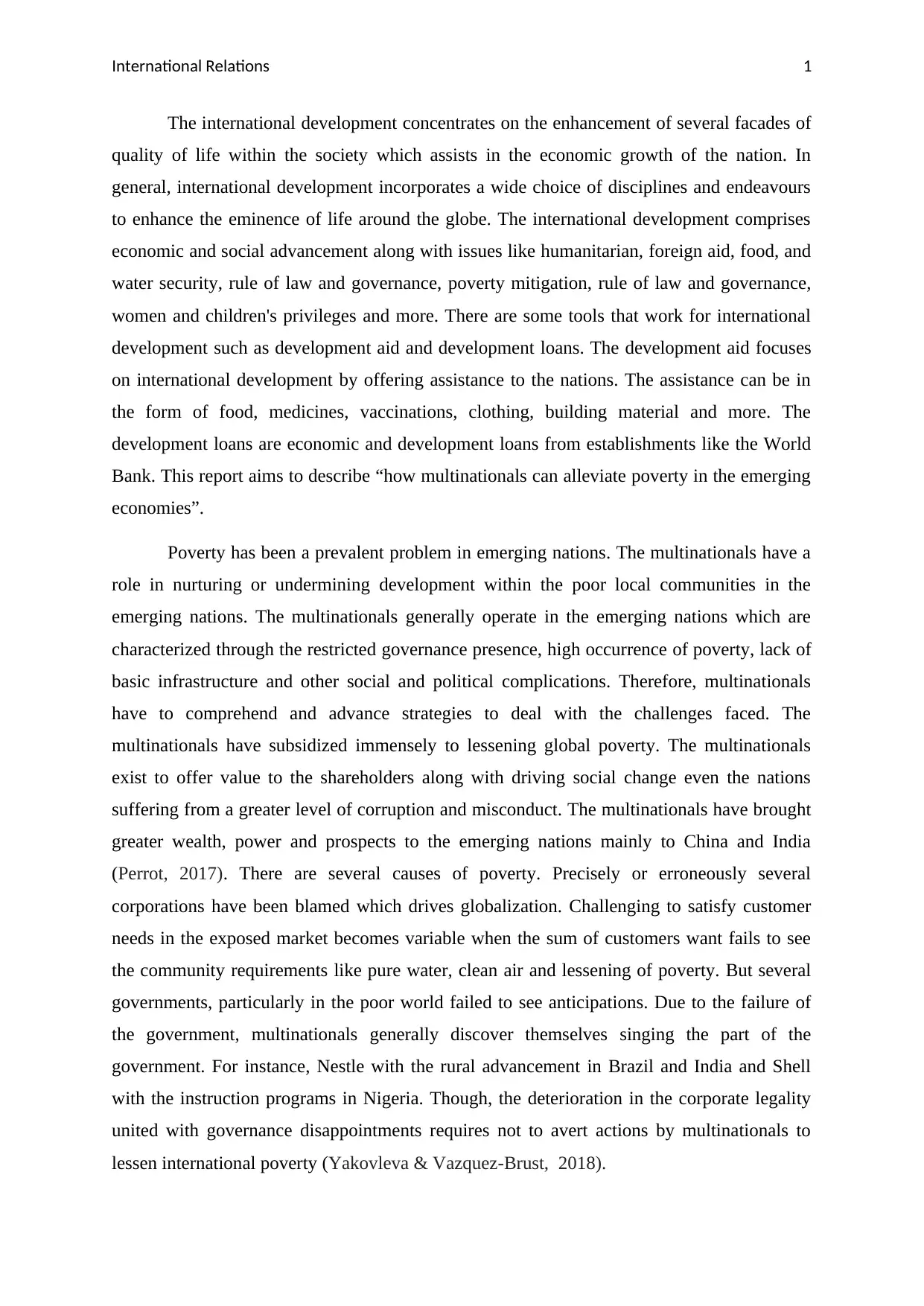
International Relations 1
The international development concentrates on the enhancement of several facades of
quality of life within the society which assists in the economic growth of the nation. In
general, international development incorporates a wide choice of disciplines and endeavours
to enhance the eminence of life around the globe. The international development comprises
economic and social advancement along with issues like humanitarian, foreign aid, food, and
water security, rule of law and governance, poverty mitigation, rule of law and governance,
women and children's privileges and more. There are some tools that work for international
development such as development aid and development loans. The development aid focuses
on international development by offering assistance to the nations. The assistance can be in
the form of food, medicines, vaccinations, clothing, building material and more. The
development loans are economic and development loans from establishments like the World
Bank. This report aims to describe “how multinationals can alleviate poverty in the emerging
economies”.
Poverty has been a prevalent problem in emerging nations. The multinationals have a
role in nurturing or undermining development within the poor local communities in the
emerging nations. The multinationals generally operate in the emerging nations which are
characterized through the restricted governance presence, high occurrence of poverty, lack of
basic infrastructure and other social and political complications. Therefore, multinationals
have to comprehend and advance strategies to deal with the challenges faced. The
multinationals have subsidized immensely to lessening global poverty. The multinationals
exist to offer value to the shareholders along with driving social change even the nations
suffering from a greater level of corruption and misconduct. The multinationals have brought
greater wealth, power and prospects to the emerging nations mainly to China and India
(Perrot, 2017). There are several causes of poverty. Precisely or erroneously several
corporations have been blamed which drives globalization. Challenging to satisfy customer
needs in the exposed market becomes variable when the sum of customers want fails to see
the community requirements like pure water, clean air and lessening of poverty. But several
governments, particularly in the poor world failed to see anticipations. Due to the failure of
the government, multinationals generally discover themselves singing the part of the
government. For instance, Nestle with the rural advancement in Brazil and India and Shell
with the instruction programs in Nigeria. Though, the deterioration in the corporate legality
united with governance disappointments requires not to avert actions by multinationals to
lessen international poverty (Yakovleva & Vazquez-Brust, 2018).
The international development concentrates on the enhancement of several facades of
quality of life within the society which assists in the economic growth of the nation. In
general, international development incorporates a wide choice of disciplines and endeavours
to enhance the eminence of life around the globe. The international development comprises
economic and social advancement along with issues like humanitarian, foreign aid, food, and
water security, rule of law and governance, poverty mitigation, rule of law and governance,
women and children's privileges and more. There are some tools that work for international
development such as development aid and development loans. The development aid focuses
on international development by offering assistance to the nations. The assistance can be in
the form of food, medicines, vaccinations, clothing, building material and more. The
development loans are economic and development loans from establishments like the World
Bank. This report aims to describe “how multinationals can alleviate poverty in the emerging
economies”.
Poverty has been a prevalent problem in emerging nations. The multinationals have a
role in nurturing or undermining development within the poor local communities in the
emerging nations. The multinationals generally operate in the emerging nations which are
characterized through the restricted governance presence, high occurrence of poverty, lack of
basic infrastructure and other social and political complications. Therefore, multinationals
have to comprehend and advance strategies to deal with the challenges faced. The
multinationals have subsidized immensely to lessening global poverty. The multinationals
exist to offer value to the shareholders along with driving social change even the nations
suffering from a greater level of corruption and misconduct. The multinationals have brought
greater wealth, power and prospects to the emerging nations mainly to China and India
(Perrot, 2017). There are several causes of poverty. Precisely or erroneously several
corporations have been blamed which drives globalization. Challenging to satisfy customer
needs in the exposed market becomes variable when the sum of customers want fails to see
the community requirements like pure water, clean air and lessening of poverty. But several
governments, particularly in the poor world failed to see anticipations. Due to the failure of
the government, multinationals generally discover themselves singing the part of the
government. For instance, Nestle with the rural advancement in Brazil and India and Shell
with the instruction programs in Nigeria. Though, the deterioration in the corporate legality
united with governance disappointments requires not to avert actions by multinationals to
lessen international poverty (Yakovleva & Vazquez-Brust, 2018).
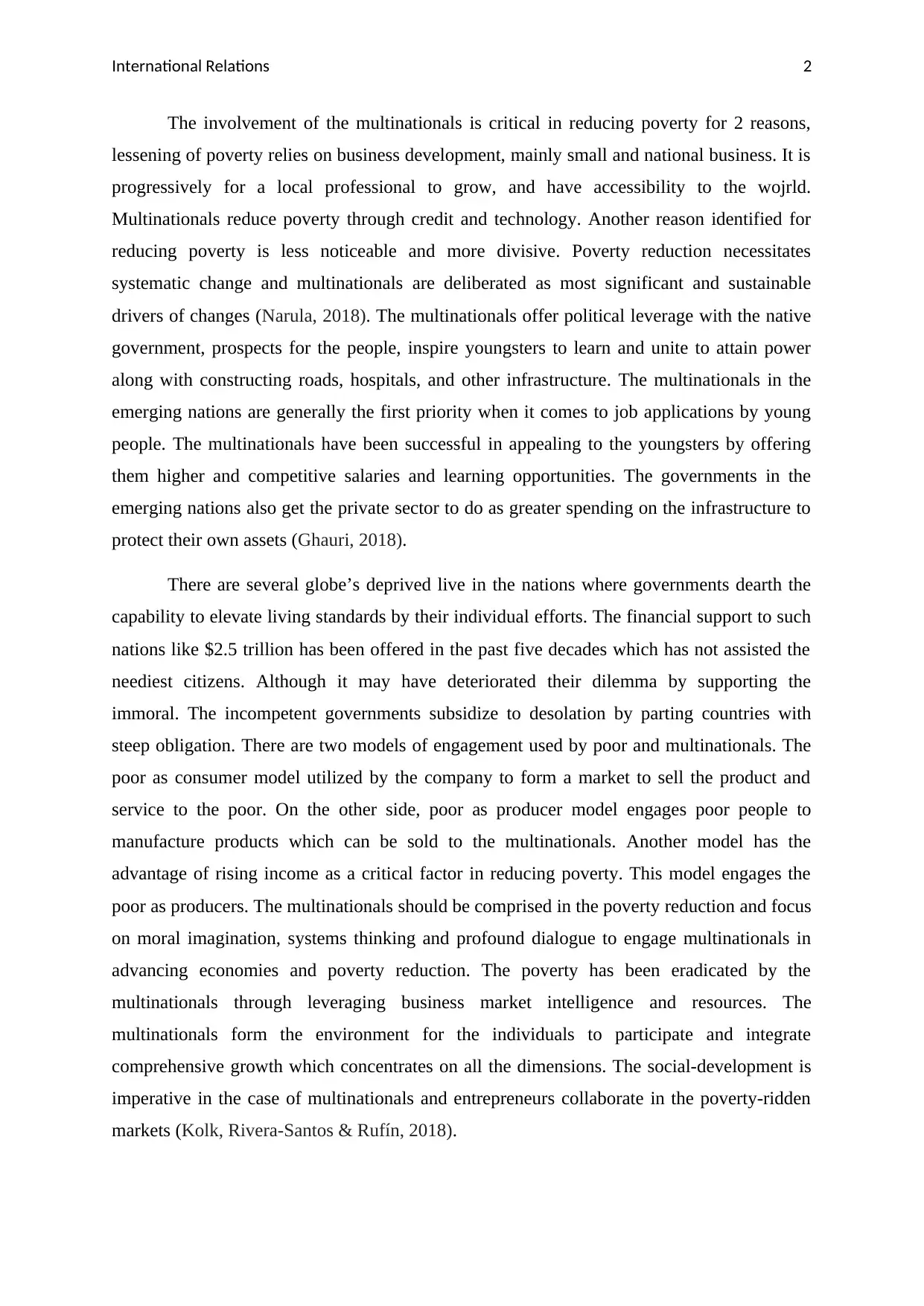
International Relations 2
The involvement of the multinationals is critical in reducing poverty for 2 reasons,
lessening of poverty relies on business development, mainly small and national business. It is
progressively for a local professional to grow, and have accessibility to the wojrld.
Multinationals reduce poverty through credit and technology. Another reason identified for
reducing poverty is less noticeable and more divisive. Poverty reduction necessitates
systematic change and multinationals are deliberated as most significant and sustainable
drivers of changes (Narula, 2018). The multinationals offer political leverage with the native
government, prospects for the people, inspire youngsters to learn and unite to attain power
along with constructing roads, hospitals, and other infrastructure. The multinationals in the
emerging nations are generally the first priority when it comes to job applications by young
people. The multinationals have been successful in appealing to the youngsters by offering
them higher and competitive salaries and learning opportunities. The governments in the
emerging nations also get the private sector to do as greater spending on the infrastructure to
protect their own assets (Ghauri, 2018).
There are several globe’s deprived live in the nations where governments dearth the
capability to elevate living standards by their individual efforts. The financial support to such
nations like $2.5 trillion has been offered in the past five decades which has not assisted the
neediest citizens. Although it may have deteriorated their dilemma by supporting the
immoral. The incompetent governments subsidize to desolation by parting countries with
steep obligation. There are two models of engagement used by poor and multinationals. The
poor as consumer model utilized by the company to form a market to sell the product and
service to the poor. On the other side, poor as producer model engages poor people to
manufacture products which can be sold to the multinationals. Another model has the
advantage of rising income as a critical factor in reducing poverty. This model engages the
poor as producers. The multinationals should be comprised in the poverty reduction and focus
on moral imagination, systems thinking and profound dialogue to engage multinationals in
advancing economies and poverty reduction. The poverty has been eradicated by the
multinationals through leveraging business market intelligence and resources. The
multinationals form the environment for the individuals to participate and integrate
comprehensive growth which concentrates on all the dimensions. The social-development is
imperative in the case of multinationals and entrepreneurs collaborate in the poverty-ridden
markets (Kolk, Rivera-Santos & Rufín, 2018).
The involvement of the multinationals is critical in reducing poverty for 2 reasons,
lessening of poverty relies on business development, mainly small and national business. It is
progressively for a local professional to grow, and have accessibility to the wojrld.
Multinationals reduce poverty through credit and technology. Another reason identified for
reducing poverty is less noticeable and more divisive. Poverty reduction necessitates
systematic change and multinationals are deliberated as most significant and sustainable
drivers of changes (Narula, 2018). The multinationals offer political leverage with the native
government, prospects for the people, inspire youngsters to learn and unite to attain power
along with constructing roads, hospitals, and other infrastructure. The multinationals in the
emerging nations are generally the first priority when it comes to job applications by young
people. The multinationals have been successful in appealing to the youngsters by offering
them higher and competitive salaries and learning opportunities. The governments in the
emerging nations also get the private sector to do as greater spending on the infrastructure to
protect their own assets (Ghauri, 2018).
There are several globe’s deprived live in the nations where governments dearth the
capability to elevate living standards by their individual efforts. The financial support to such
nations like $2.5 trillion has been offered in the past five decades which has not assisted the
neediest citizens. Although it may have deteriorated their dilemma by supporting the
immoral. The incompetent governments subsidize to desolation by parting countries with
steep obligation. There are two models of engagement used by poor and multinationals. The
poor as consumer model utilized by the company to form a market to sell the product and
service to the poor. On the other side, poor as producer model engages poor people to
manufacture products which can be sold to the multinationals. Another model has the
advantage of rising income as a critical factor in reducing poverty. This model engages the
poor as producers. The multinationals should be comprised in the poverty reduction and focus
on moral imagination, systems thinking and profound dialogue to engage multinationals in
advancing economies and poverty reduction. The poverty has been eradicated by the
multinationals through leveraging business market intelligence and resources. The
multinationals form the environment for the individuals to participate and integrate
comprehensive growth which concentrates on all the dimensions. The social-development is
imperative in the case of multinationals and entrepreneurs collaborate in the poverty-ridden
markets (Kolk, Rivera-Santos & Rufín, 2018).
⊘ This is a preview!⊘
Do you want full access?
Subscribe today to unlock all pages.

Trusted by 1+ million students worldwide
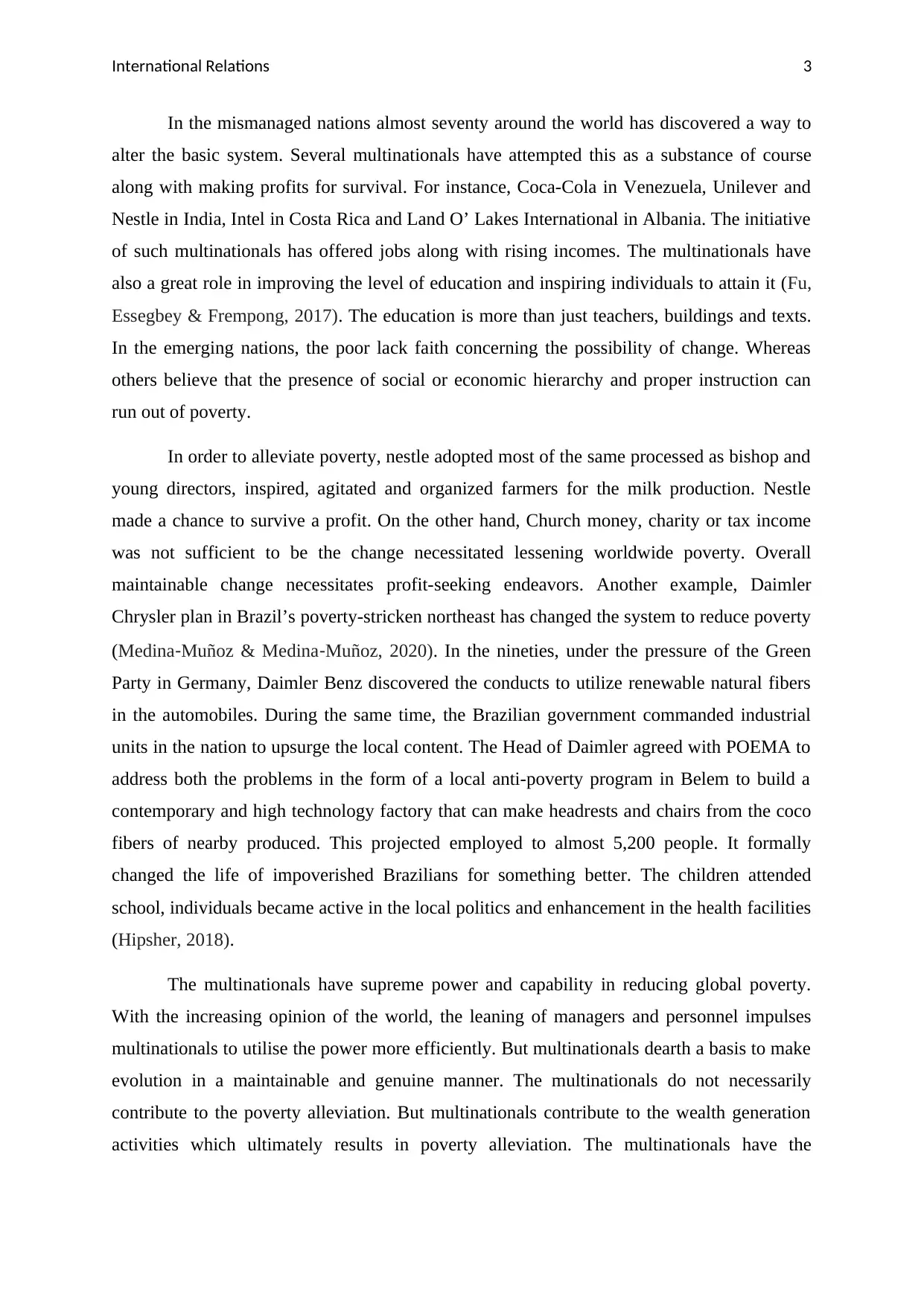
International Relations 3
In the mismanaged nations almost seventy around the world has discovered a way to
alter the basic system. Several multinationals have attempted this as a substance of course
along with making profits for survival. For instance, Coca-Cola in Venezuela, Unilever and
Nestle in India, Intel in Costa Rica and Land O’ Lakes International in Albania. The initiative
of such multinationals has offered jobs along with rising incomes. The multinationals have
also a great role in improving the level of education and inspiring individuals to attain it (Fu,
Essegbey & Frempong, 2017). The education is more than just teachers, buildings and texts.
In the emerging nations, the poor lack faith concerning the possibility of change. Whereas
others believe that the presence of social or economic hierarchy and proper instruction can
run out of poverty.
In order to alleviate poverty, nestle adopted most of the same processed as bishop and
young directors, inspired, agitated and organized farmers for the milk production. Nestle
made a chance to survive a profit. On the other hand, Church money, charity or tax income
was not sufficient to be the change necessitated lessening worldwide poverty. Overall
maintainable change necessitates profit-seeking endeavors. Another example, Daimler
Chrysler plan in Brazil’s poverty-stricken northeast has changed the system to reduce poverty
(Medina‐Muñoz & Medina‐Muñoz, 2020). In the nineties, under the pressure of the Green
Party in Germany, Daimler Benz discovered the conducts to utilize renewable natural fibers
in the automobiles. During the same time, the Brazilian government commanded industrial
units in the nation to upsurge the local content. The Head of Daimler agreed with POEMA to
address both the problems in the form of a local anti-poverty program in Belem to build a
contemporary and high technology factory that can make headrests and chairs from the coco
fibers of nearby produced. This projected employed to almost 5,200 people. It formally
changed the life of impoverished Brazilians for something better. The children attended
school, individuals became active in the local politics and enhancement in the health facilities
(Hipsher, 2018).
The multinationals have supreme power and capability in reducing global poverty.
With the increasing opinion of the world, the leaning of managers and personnel impulses
multinationals to utilise the power more efficiently. But multinationals dearth a basis to make
evolution in a maintainable and genuine manner. The multinationals do not necessarily
contribute to the poverty alleviation. But multinationals contribute to the wealth generation
activities which ultimately results in poverty alleviation. The multinationals have the
In the mismanaged nations almost seventy around the world has discovered a way to
alter the basic system. Several multinationals have attempted this as a substance of course
along with making profits for survival. For instance, Coca-Cola in Venezuela, Unilever and
Nestle in India, Intel in Costa Rica and Land O’ Lakes International in Albania. The initiative
of such multinationals has offered jobs along with rising incomes. The multinationals have
also a great role in improving the level of education and inspiring individuals to attain it (Fu,
Essegbey & Frempong, 2017). The education is more than just teachers, buildings and texts.
In the emerging nations, the poor lack faith concerning the possibility of change. Whereas
others believe that the presence of social or economic hierarchy and proper instruction can
run out of poverty.
In order to alleviate poverty, nestle adopted most of the same processed as bishop and
young directors, inspired, agitated and organized farmers for the milk production. Nestle
made a chance to survive a profit. On the other hand, Church money, charity or tax income
was not sufficient to be the change necessitated lessening worldwide poverty. Overall
maintainable change necessitates profit-seeking endeavors. Another example, Daimler
Chrysler plan in Brazil’s poverty-stricken northeast has changed the system to reduce poverty
(Medina‐Muñoz & Medina‐Muñoz, 2020). In the nineties, under the pressure of the Green
Party in Germany, Daimler Benz discovered the conducts to utilize renewable natural fibers
in the automobiles. During the same time, the Brazilian government commanded industrial
units in the nation to upsurge the local content. The Head of Daimler agreed with POEMA to
address both the problems in the form of a local anti-poverty program in Belem to build a
contemporary and high technology factory that can make headrests and chairs from the coco
fibers of nearby produced. This projected employed to almost 5,200 people. It formally
changed the life of impoverished Brazilians for something better. The children attended
school, individuals became active in the local politics and enhancement in the health facilities
(Hipsher, 2018).
The multinationals have supreme power and capability in reducing global poverty.
With the increasing opinion of the world, the leaning of managers and personnel impulses
multinationals to utilise the power more efficiently. But multinationals dearth a basis to make
evolution in a maintainable and genuine manner. The multinationals do not necessarily
contribute to the poverty alleviation. But multinationals contribute to the wealth generation
activities which ultimately results in poverty alleviation. The multinationals have the
Paraphrase This Document
Need a fresh take? Get an instant paraphrase of this document with our AI Paraphraser
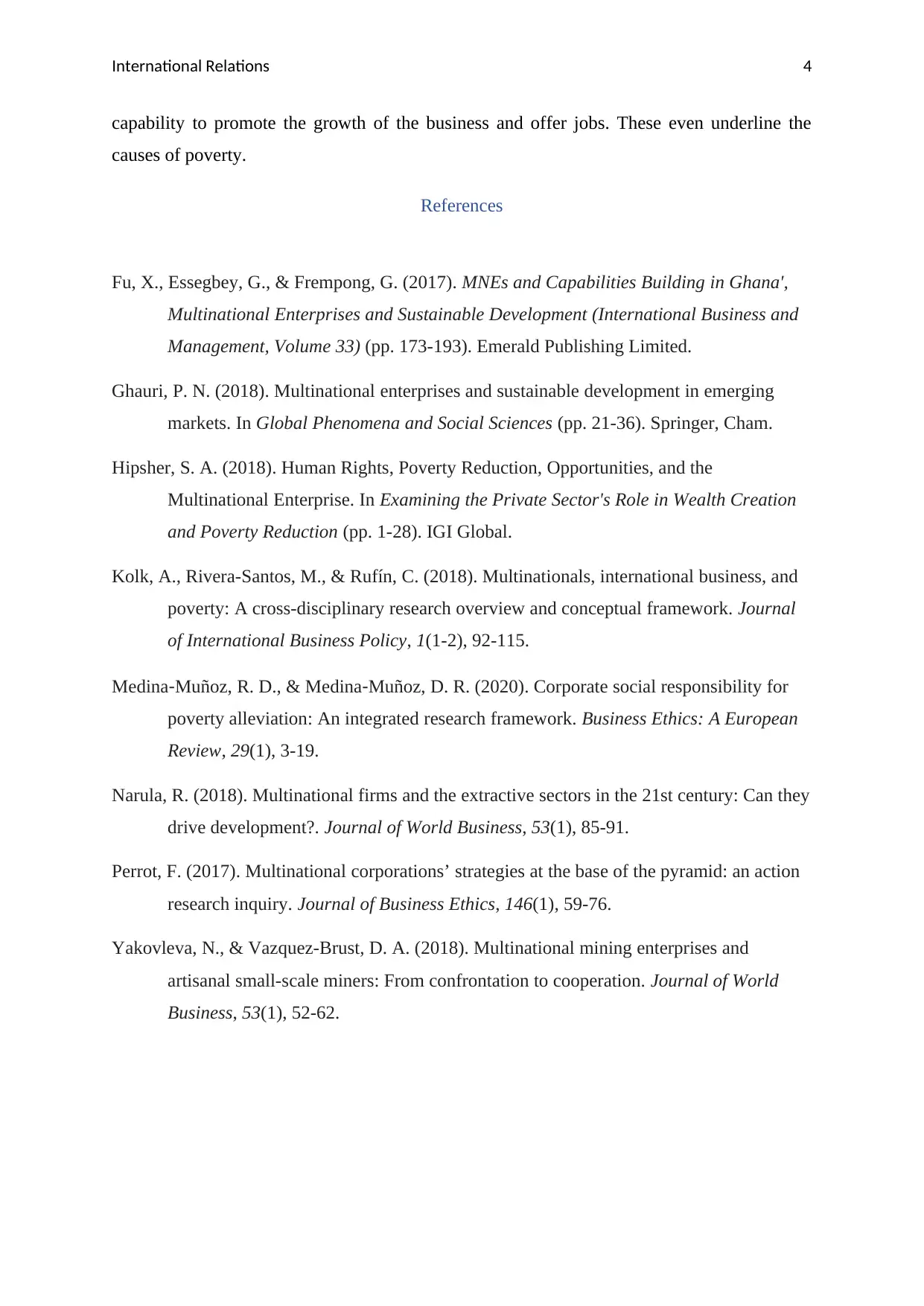
International Relations 4
capability to promote the growth of the business and offer jobs. These even underline the
causes of poverty.
References
Fu, X., Essegbey, G., & Frempong, G. (2017). MNEs and Capabilities Building in Ghana',
Multinational Enterprises and Sustainable Development (International Business and
Management, Volume 33) (pp. 173-193). Emerald Publishing Limited.
Ghauri, P. N. (2018). Multinational enterprises and sustainable development in emerging
markets. In Global Phenomena and Social Sciences (pp. 21-36). Springer, Cham.
Hipsher, S. A. (2018). Human Rights, Poverty Reduction, Opportunities, and the
Multinational Enterprise. In Examining the Private Sector's Role in Wealth Creation
and Poverty Reduction (pp. 1-28). IGI Global.
Kolk, A., Rivera-Santos, M., & Rufín, C. (2018). Multinationals, international business, and
poverty: A cross-disciplinary research overview and conceptual framework. Journal
of International Business Policy, 1(1-2), 92-115.
Medina‐Muñoz, R. D., & Medina‐Muñoz, D. R. (2020). Corporate social responsibility for
poverty alleviation: An integrated research framework. Business Ethics: A European
Review, 29(1), 3-19.
Narula, R. (2018). Multinational firms and the extractive sectors in the 21st century: Can they
drive development?. Journal of World Business, 53(1), 85-91.
Perrot, F. (2017). Multinational corporations’ strategies at the base of the pyramid: an action
research inquiry. Journal of Business Ethics, 146(1), 59-76.
Yakovleva, N., & Vazquez-Brust, D. A. (2018). Multinational mining enterprises and
artisanal small-scale miners: From confrontation to cooperation. Journal of World
Business, 53(1), 52-62.
capability to promote the growth of the business and offer jobs. These even underline the
causes of poverty.
References
Fu, X., Essegbey, G., & Frempong, G. (2017). MNEs and Capabilities Building in Ghana',
Multinational Enterprises and Sustainable Development (International Business and
Management, Volume 33) (pp. 173-193). Emerald Publishing Limited.
Ghauri, P. N. (2018). Multinational enterprises and sustainable development in emerging
markets. In Global Phenomena and Social Sciences (pp. 21-36). Springer, Cham.
Hipsher, S. A. (2018). Human Rights, Poverty Reduction, Opportunities, and the
Multinational Enterprise. In Examining the Private Sector's Role in Wealth Creation
and Poverty Reduction (pp. 1-28). IGI Global.
Kolk, A., Rivera-Santos, M., & Rufín, C. (2018). Multinationals, international business, and
poverty: A cross-disciplinary research overview and conceptual framework. Journal
of International Business Policy, 1(1-2), 92-115.
Medina‐Muñoz, R. D., & Medina‐Muñoz, D. R. (2020). Corporate social responsibility for
poverty alleviation: An integrated research framework. Business Ethics: A European
Review, 29(1), 3-19.
Narula, R. (2018). Multinational firms and the extractive sectors in the 21st century: Can they
drive development?. Journal of World Business, 53(1), 85-91.
Perrot, F. (2017). Multinational corporations’ strategies at the base of the pyramid: an action
research inquiry. Journal of Business Ethics, 146(1), 59-76.
Yakovleva, N., & Vazquez-Brust, D. A. (2018). Multinational mining enterprises and
artisanal small-scale miners: From confrontation to cooperation. Journal of World
Business, 53(1), 52-62.
1 out of 5
Related Documents
Your All-in-One AI-Powered Toolkit for Academic Success.
+13062052269
info@desklib.com
Available 24*7 on WhatsApp / Email
![[object Object]](/_next/static/media/star-bottom.7253800d.svg)
Unlock your academic potential
Copyright © 2020–2025 A2Z Services. All Rights Reserved. Developed and managed by ZUCOL.





